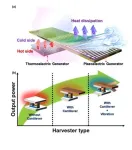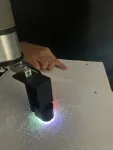(Press-News.org) (Utrecht/Vienna, 29.1.2024) Neuroblastoma mainly affects toddlers and young children - in the EU region there are 1500 new cases per year. Neuroblastoma is a malignant tumor of the peripheral nervous system and around 50% of patients are high-risk cases. Recurrences occur frequently, and conventional therapies are no longer effective for these children. With liquid biopsies it is possible to monitor therapy success and to predict the recurrence of the tumor in time to take medical countermeasures. Scientists from leading European research institutions in paediatric oncology are testing this promising diagnostic tool under the coordination of the European Society for Pediatric Oncology (SIOPE) and scientific lead of the Princess Máxima Center for pediatric oncology and St. Anna Children's Cancer Research Institute. The framework is a five-year Horizon Europe project.
Liquid biopsies are a promise for the future of personalized cancer medicine: Many children with high-risk neuroblastoma, i.e. 50 percent of all neuroblastoma cases, are at risk of not responding to therapy and developing a recurrence. Until now, the success of the therapy has been monitored with medical imaging procedures and bone marrow examinations. These examinations are expensive, invasive, and stressful for children who need anesthesia. Liquid biopsies are small blood samples, so the procedure is minimally invasive, and comparatively simple.In the laboratory, the sample can be used to determine whether children have responded to therapies. Finally, an impending recurrence can be detected early. Genetic tumor markers in the blood plasma, small pieces of DNA and messenger RNA (mRNA), which are released by tumor cells and provide information about the genetic changes in the tumor, are examined. In the event of a relapse, these can help to find targeted therapies for children with neuroblastoma. For example, the enzyme anaplastic lymphoma kinase (ALK) plays a decisive role in cancer development. If a child’s tumor has a fault in the ALK-gene, it could be targeted with ALK inhibiting drugs.
Liquid biopsies in the clinical setting for the first time
A total of 25 leading European research institutions in pediatric oncology have now joined forces for an EU project funded by Horizon Europe. The aim is to study the benefit of these new diagnostic methods – small blood samples will be collected several times from 150 patients with high-risk neuroblastoma and will be examined in laboratories such as the Princess Máxima Center and Labdia Labordiagnostik GmbH. The European Society for Paediatric Oncology (SIOP Europe or SIOPE) is coordinating the research project, which is funded with a total of eight million euros. The goal of the project with the title A SIOPEN study to MOnitor NeuroblastomA relapse with LIquid biopsy Sensitive Analysis - in short: MONALISA – is to develop a clinical study that can be quickly implemented in clinical practice. "And this is already the first special feature," says Sabine Taschner-Mandl, Principal Investigator at St. Anna Children's Cancer Research Institute, who is co-leading liquid biopsy diagnostics in MONALISA. “We are using liquid biopsies for children with neuroblastoma for the first time in a clinical setting; so far, we have only tested them in research," says the tumor biologist.
Dr. Lieve Tytgat, pediatric oncologist specialized in neuroblastoma at the Princess Máxima Center for pediatric oncology, and scientific co-lead of the MONALISA project, says: ‘This research is a real breakthrough in the world of non-invasive diagnostics. Liquid biopsies are increasingly commonly used in adults with cancer. With this study we aim to catch up with research in adults; an important development for children with cancer.’
Monitoring the response to therapy and disease course is of great importance for improving the chance of survival of patients with high-risk neuroblastoma. MONALISA aims to close existing gaps in diagnostics and establish liquid biopsies as a standard procedure for monitoring relapsed neuroblastoma. The method could also serve as a blueprint for other pediatric cancers. Marie Bernkopf, scientist at St. Anna Children's Cancer Research Institute and head of the Labdia Laboratory Diagnostics Department where the analyses are carried out, emphasizes that technological progress here will bring a significant improvement for children and parents. For example, in some countries, mobile nurses will be able to take blood samples at home for the check-ups, thus eliminating the burdensome trip to the clinic.
MONALISA also aims to analyze how patients and parents experience the use of liquid biopsies to be able to adapt the procedure in the future. With the project, the scientists are getting one step closer to effective personalized medicine in children with neuroblastoma and will offer hope for a a better chance to be cured.
About MONALISA:
The project, funded by the Horizon Europe funding program of the European Commission with eight million Euro, will run for five years. Among the institutions participating in the project are St. Anna Children's Cancer Research Institute and Labdia Labordiagnostik GmbH, the Berlin Charité, the French Institute Curie, the Dutch Princess Máxima Center for pediatric oncology, the University Hospital in Motol, the Interuniversity Microelectronics Center, the Flemish Institute of Biotechnology, the Institute Gustave Roussy, the Academic Medical Center in Amsterdam, the University of Leeds, the National and Kapodistrian University of Athens, the Agia Sofia Childrens Hospital,, the Eberhard Karls University Tübingen, the Solving Children Cancer, the Institute Giannina Gaslini, the University of Gent, the Childrens Health Ireland, the SIOPEN Association, the Vall d'Hebron Research Institute, the Evaluation Software Development, Vlaams Instituut Biotechnologie - FlandersInstitute for Biotechnology and further Austrian partners from the Medical University of Innsbruck, the Austrian Institute of Technology (AIT) and SIOP Europe.
The Kick-off Meeting of MONALISA takes place in the St. Anna Children’s Cancer Research Institute from 29th January to 30th January. The European Society for Pediatric Oncology Neuroblastoma is organising the upcoming SIOPEN Translational Research Meeting from 30.1. to 1.2. in Vienna at the Medical University, Van Swieten Saal, Van-Swieten-Gasse 1a, 1090 Vienna. The first day is dedicated to the topic of liquid biopsy.
END
Neuroblastoma: Liquid biopsies to detect relapse of childhood cancer early
2024-01-29
ELSE PRESS RELEASES FROM THIS DATE:
Speaking in a local accent might make social robots seem more trustworthy and competent
2024-01-29
Social robots can help us with many things: teaching, learning, caring. Because they’re designed to interact with humans, they’re designed to make us comfortable — and that includes the way they talk. But how should they talk? Some research suggests that people like robots to use a familiar accent or dialect, while other research suggests the opposite.
“Surprisingly, people have mixed feelings about robots speaking in a dialect — some like it, while others prefer standard language,” said Katharina Kühne of the University of Potsdam, lead author ...
Hybrid energy harvesters that harness heat and vibration simultaneously
2024-01-29
Harvesting energy sources such as heat, vibration, light, and electromagnetic waves from everyday environments such as industrial sites and automobiles and converting them into electrical energy is known as energy harvesting. Energy harvesting makes it easier to power today's popular IoT sensors and wireless devices that are located in environments where battery replacement is difficult.
Dr. Hyun-Cheol Song and Dr. Sunghoon Hur of Electronic Materials Research Center at the Korea Institute of Science and Technology (KIST) have developed a hybrid energy harvesting ...
Organ donations after MAiD made up 14% of deceased donations in Quebec
2024-01-29
Organ donation after medical assistance in dying (MAiD) represented 14% of Quebec's total deceased donations in 2022, according to a new study in CMAJ (Canadian Medical Association Journal) https://www.cmaj.ca/lookup/doi/10.1503/cmaj.230883.
To understand the impact of organ donation after MAiD, Quebec researchers analyzed data on all patients referred to Transplant Québec for possible organ donation after MAiD from January 2018 to December 2022. This represented the first 5 full years when organ donation after MAiD was allowed in the province. Over the 5-year period, Transplant Québec received 245 referrals for donation after MAiD, ...
Polycystic ovarian syndrome: new review to help diagnose and manage
2024-01-29
A new review in CMAJ (Canadian Medical Association Journal) is aimed at helping clinicians diagnose and manage polycystic ovarian syndrome (PCOS), an endocrine disorder that affects about 10% of femaleshttps://www.cmaj.ca/lookup/doi/10.1503/cmaj.231251.
This disorder affects females of reproductive age and is associated with infertility, miscarriage and pregnancy complications. Its long-term health consequences include hypertension, cancer risks, and metabolic and psychological impacts. Patients usually present to health care between ages 18 and 39 years complaining of menstrual cycle irregularities, ...
Robot trained to read braille at twice the speed of humans
2024-01-29
Researchers have developed a robotic sensor that incorporates artificial intelligence techniques to read braille at speeds roughly double that of most human readers.
The research team, from the University of Cambridge, used machine learning algorithms to teach a robotic sensor to quickly slide over lines of braille text. The robot was able to read the braille at 315 words per minute at close to 90% accuracy.
Although the robot braille reader was not developed as an assistive technology, the researchers say the high sensitivity required to read braille makes it an ideal test in the development of robot ...
Obesity and alcohol are contributing to increases in bowel cancer rates among young adults
2024-01-29
Overweight and obesity are contributing to rising death rates from bowel cancer among people aged 25-49 years in the European Union (EU) and the UK, although death rates from this type of cancer are decreasing overall across Europe.
These findings are from a new study published in the leading cancer journal Annals of Oncology [1] today (Monday), which predicts death rates from cancer in the EU and UK for 2024. It is the first time that an increase in bowel cancer death rates among young adults has been predicted for the EU, and it confirms a trend in the UK that the researchers first noted in 2021.
Researchers led by Carlo La Vecchia (MD), ...
Playing an instrument linked to better brain health in older adults
2024-01-29
Engaging in music throughout your life is associated with better brain health in older age, according to a new study published by experts at the University of Exeter.
Scientists working on PROTECT, an online study open to people aged 40 and over, reviewed data from more than a thousand adults over the age of 40 to see the effect of playing a musical instrument – or singing in a choir - on brain health. Over 25000 people have signed up for the PROTECT study, which has been running for 10 years.
The team reviewed participants’ musical experience and lifetime exposure ...
New research finds volume alone does not predict quality outcomes in pediatric cardiac surgery
2024-01-28
A study of pediatric heart surgery centers across the United States has demonstrated that, when it comes to successful surgery, it’s not just the size of the program that matters in determining quality outcomes.
Historically, hospitals with a “low volume” of pediatric heart operations—in this case, those that perform 103 surgeries or fewer a year—have been associated with worse outcomes for patients. However, a team led by D. Chauhan, MD, from WVU Medicine Children’s ...
Almost 50% of patients under 60 years choose TAVR over surgical aortic valve replacement with worse outcomes
2024-01-28
Despite national guidelines recommending surgical aortic valve replacement (SAVR) for patients under age 65 with severe aortic stenosis, many hospitals are still opting for a nonsurgical approach in patients under 60—possibly with poorer survival rates.
In a study presented at The Society of Thoracic Surgeons’ 2024 Annual Meeting in San Antonio, Texas, researchers from the department of cardiac surgery in the Smidt Heart Institute at Cedars-Sinai in Los Angeles and the department of population health science and policy at Mount Sinai New York compared ...
New study reveals the profound impact of forced separation between humans and their pets
2024-01-28
Pet owners forced to be separated from their animals in crisis situations, including those who are victims of domestic violence, are suffering from a lack of support services needed to protect them.
These are the findings of a new review of 27 years of international research, published in the peer-reviewed journal Anthrozoös, which unveils the increased risks to both safety and psychological well-being when people are faced with the threat of forced separation from their pets.
The results provide important insights towards addressing the challenges arising from domestic violence, homelessness or natural disasters that can threaten the bond between humans and ...


